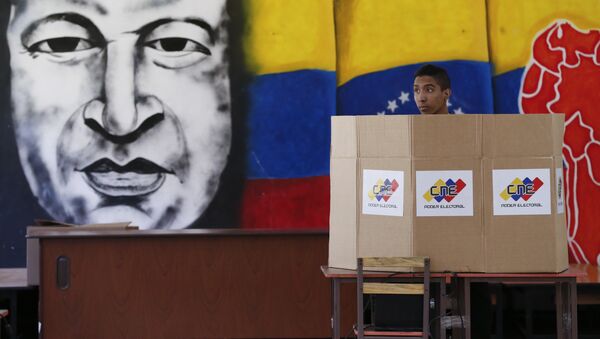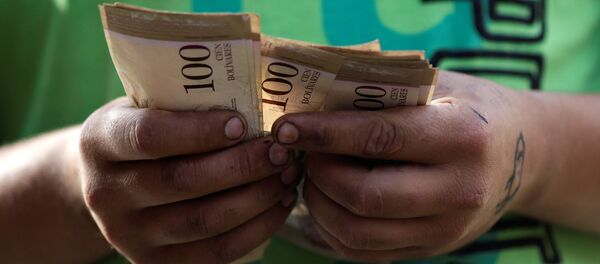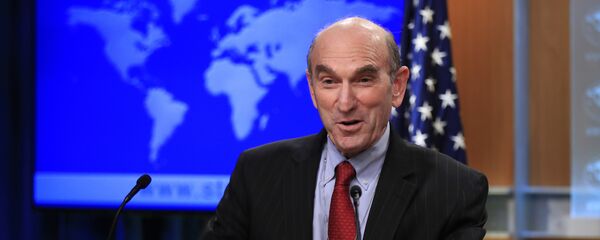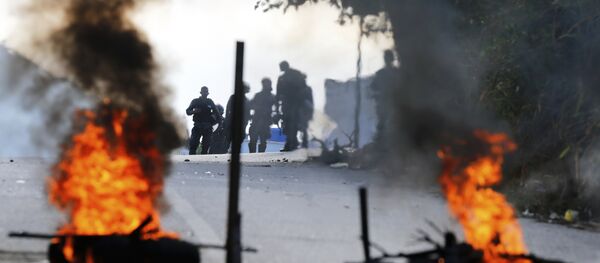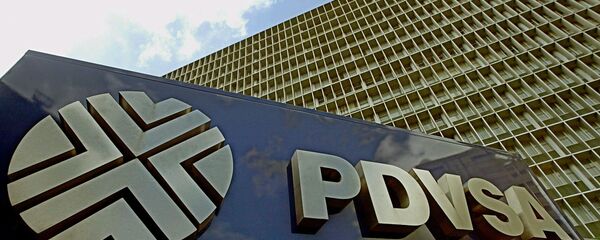Sputnik: Okay then, Paul, so Nicolas Maduro is saying that the United States declared a humanitarian crisis in Venezuela to create a cover for its military plans. How much is true there to this statement do you feel?
Paul Webster Hare: Well, there is no doubt that there is a major humanitarian crisis. Some have described it as the largest migration, forced migration in Latin America history.
So, you know, the health system is in a very bad state and there is clearly malnutrition around from all we can gather. So I think there is no doubt about that. And you know, during the years of Hugo Chavez, who is certainly no friend of the United States, there was not anything approaching this calamitous state of the economy and pressurising people to leave out of desperation.
READ MORE: ‘Montevideo Mechanism' Seeks ‘Zero' Point to Start Negotiations in Venezuela
Sputnik: Now [Mike] Pompeo now recently said that Washington wants Venezuela to rely less on Russia and Cuba after a peaceful transition of power takes place. What do you make of his statement?
Paul Webster Hare: Well, I think it wouldn't be too difficult to assume that would be the case given that President Trump has reversed some of what President Obama did with reconciling with Cuba or at least establishing a kind of more normal basis for diplomatic relations. I don't think lessening the influence of Cuba and Russia is top on the agenda right now.
You know, different leaders in America have had different approaches to Cuba. President Obama, of course, visited Havana. He was well received, he didn't disguise the differences between Cuba and the United States but at the same time he said: "let's work on the things we can do together". Now President Trump has had a different approach.
In terms of Russia, I mean there are obvious areas where President Trump has said he wants to work with Russia, one could be on, you know, nuclear arms control. I think they mentioned that at the Helsinki Summit. So I think the immediate focus is on other areas but you know clearly you don't need to be too astute to read the messaging between the United States and Cuba at the moment.
READ MORE: Maduro: Venezuela's Independence Being Destroyed Under Cloak of Humanitarian Aid
Sputnik: Well, for sure, as some experts have said as well that the US was also pressuring Cuba when they along with Canada cut their diplomatic staff in Havana. How justified was this decision and what benefit was there for Canada to go along with this?
Paul Webster Hare: Yes, Canada has long had a very different policy towards Cuba from the United States. Pierre Trudeau, of course, the father of the present Prime Minister of Canada Justin [Trudeau], was a close friend of Fidel Castro.
Fidel Castro was one of the bearers of his casket at his funeral, so they were very close. Canada always votes along with the EU and virtually every country in the world against the US embargo when it comes up at the UN General Assembly.
So I don't think there is any way you can suggest that Canada follows US policy on Cuba. The diplomats have been affected by these mysterious happenings. It is odd that it appears only to be American and Canadian diplomats so far when, of course, as I well know, Havana is full of many diplomatic missions, so it is a mystery. One day it will be resolved I think and both Canada and the United States will restore a bigger diplomatic presence but at the moment I think as the question suggests it is a bit of a stalemate.
READ MORE: 'End Game': US Venezuela Envoy Wants Maduro to Flee to Russia or Cuba
Sputnik: Well, you have used that word "mystery". I mean what is the rationale behind portraying Cuba as a threat given Havana's willingness to put on record to cooperate in the investigation.
Paul Webster Hare: Cuba is the protecting power under the Vienna Convention of all diplomats. So if it happens on your watch and clearly diplomats have been affected but there's little I evidence of any tourists [being affected]. You know, Havana is always full of tourists and visiting business people and so on.
I mean it is well known that diplomats in Havana are monitored for their activities and so on. We certainly knew that when I was a diplomat there. So, it is a mystery at this stage. Cuba is maintaining its position but Cuba does have a responsibility to protect all diplomats in its capital.
Sputnik: And that leads to the question. Who is profiting from denigrating Cuba this way? What is your take on that particular question?
Paul Webster Hare: You know, the Trump administration has decided to pressurise Cuba to try and limit exchanges on commerce and investment more than the loosening that was going on under President Obama.
There is no secret about that. He has made it clear and he supports the views of people like Marco Rubio that the current regime is not legitimate, I think he's called them corrupt, and that they need to respect the wishes of the Cuban people.
So that is their stance. It does not have a vast amount of support from most Americans, according to opinion polls, and even from Cuban Americans, who favour building bridges and opening up, you know, not necessarily approving of everything that goes on on the island just as the island does not approve of everything that goes on in the United States. But they do believe that diplomacy and dialogue is the way forward.
So the US is pretty isolated in its current Cuba policy. It will be interesting to see whether the coalition they have built on the Venezuela issue has any momentum to build on a coalition with Cuba but I think the case is a very different [one].
There is a major humanitarian crisis in Venezuela. There is clear evidence of harassment of the opposition. There were not full and free elections. And the only way of resolving it is, I think, to return and have full and free elections where the results are clear and monitored. And hopefully, Venezuela can begin to rebuild itself and Venezuelans will return home.
READ MORE: Facts to Know About Oil Giant PDVSA as Venezuela Slams US Sanctions as 'Robbery'
Sputnik: Well, you have alluded to some of the points of view that you feel about Venezuela. I was just about to ask you actually in terms of your depth of knowledge from a diplomatic point of view, what your stance was with regard to the current situation. I mean there are mixed messages coming out from Venezuela.
What is your particular stance, you have mentioned that obviously free and fair general election should be held but do you think that a more passive stance should be taken by America or is America just basically storming as normal because of the underpinning of the oil resources, of course? What is your take?
They were middle-class people, they had money. But the recent waves, you know, going back the last year or so, have been driven out by desperation. You know, the lower echelons of society and not the affluent Venezuelans, who were originally the Chavistas.
So in the country, yes, obviously, Maduro still has support. I mean he has support in the military. Their ways of securing that support through privileged access to food and perks on housing and the military are very involved in the businesses and so on. So that is perhaps not surprising and the rallies suggest a very divided country as you have mentioned. The only way really of resolving that, I mean Venezuela does not appear to have the capacity to sort of pull itself out economically. Russia has given them a lot of credit.
READ MORE: Maduro Says US Is Trying to Steal Venezuelan Riches In The Name Of Democracy
Russia has got certain oil concessions I think as you know through Rosneft, they have taken a slice of the Citgo company PDVSA. And China too is dependent on Venezuelan oil supplies. They have an arrangement for 400,000 barrels a day. So both all the countries are involved in different ways.
So it would suggest that you know there needs to be a round table conference where all interested parties can come to the conclusion that the only way of settling this is through the ballot box and there needs to be a resolution. Then if Maduro and his allies win, you know, that would indicate a way forward.
So we should see what happens and, you know, Russia and China have got big stakes as well in restoring stability, restoring economic viability to Venezuela.
Views and opinions, expressed in the article are those of Paul Webster Hare and do not necessarily reflect those of Sputnik
